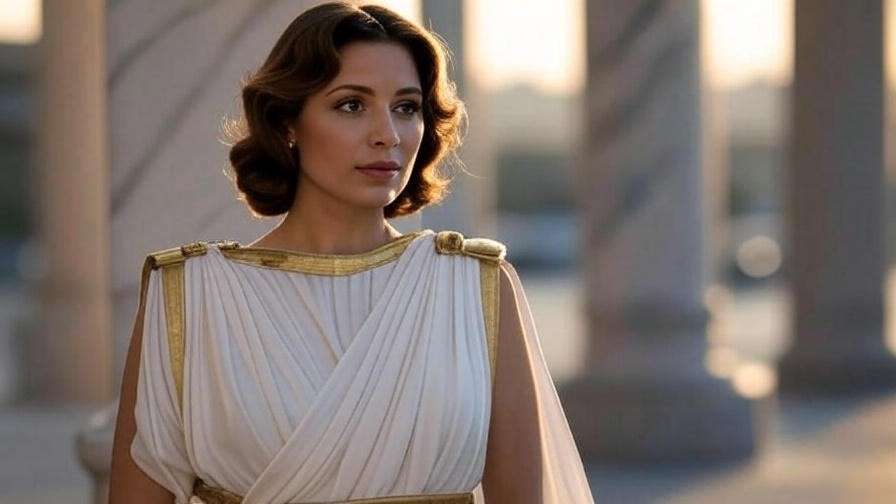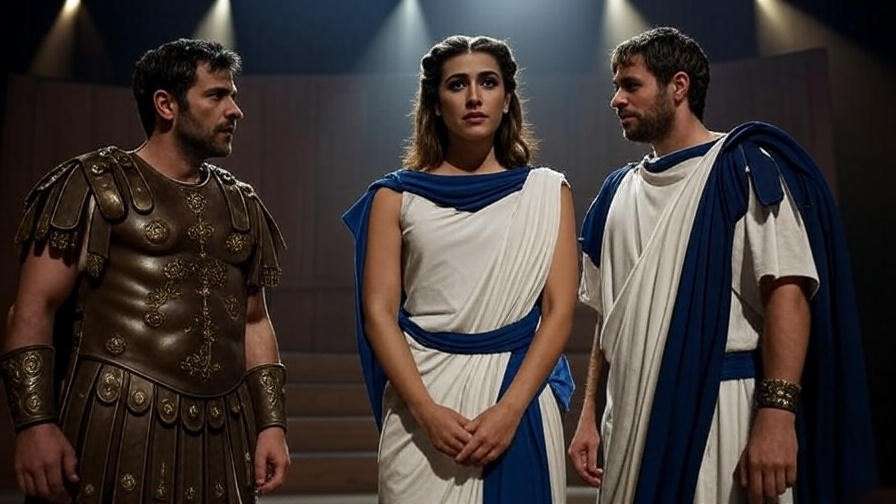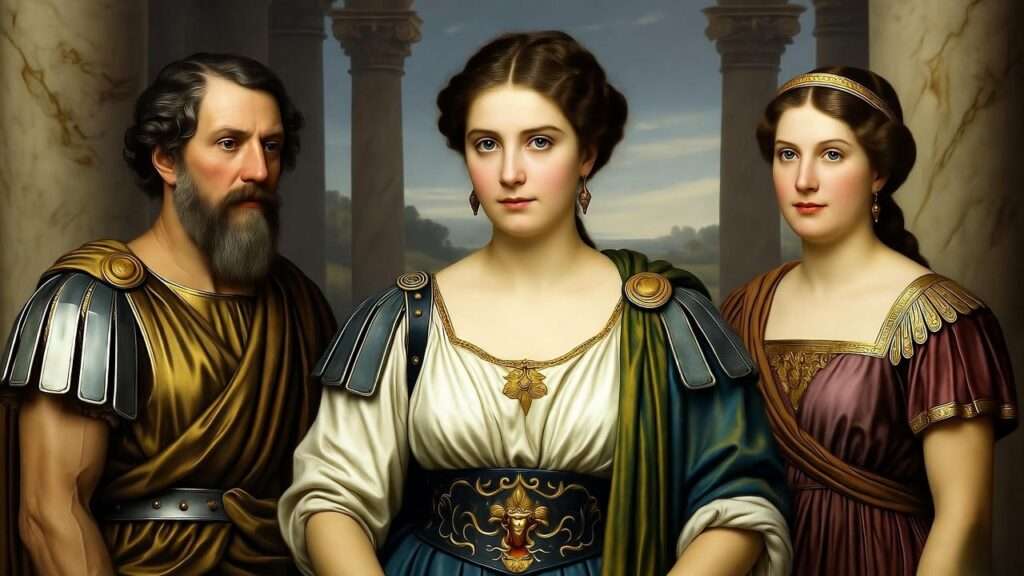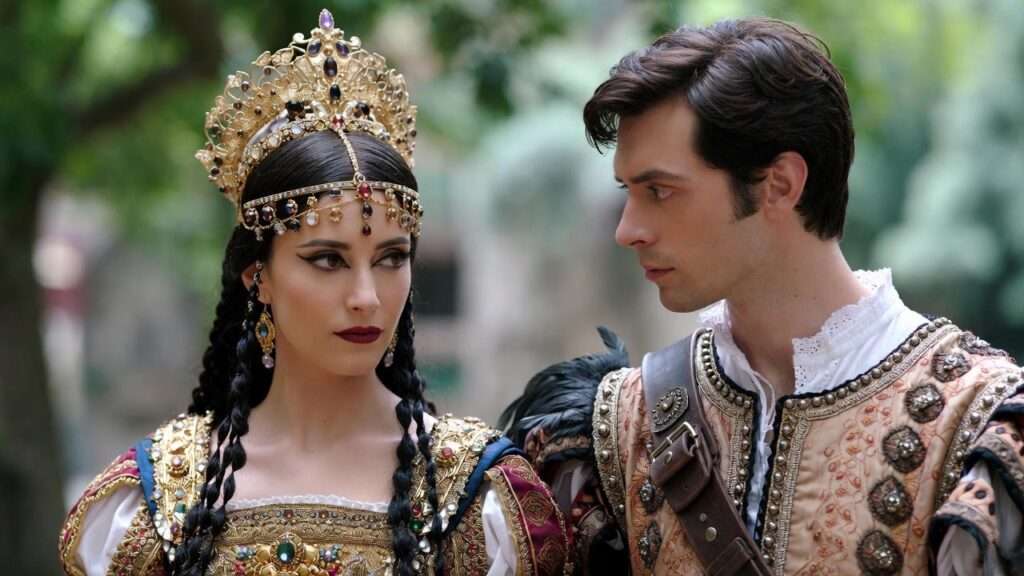Imagine a woman caught in the crossfire of Rome’s most powerful men, her life a delicate thread woven into the fabric of political ambition and personal betrayal. In William Shakespeare’s Antony and Cleopatra, Octavia, the sister of Octavius Caesar and wife of Mark Antony, embodies this precarious existence. Though her stage presence is brief, her role as a symbol of duty, sacrifice, and Roman virtue reverberates throughout the play. This article explores Octavia in Antony and Cleopatra, delving into her historical roots, dramatic function, and enduring relevance. Whether you’re a student, scholar, or Shakespeare enthusiast, this comprehensive analysis will illuminate why Octavia matters and how she shapes the play’s tragic narrative.
As a Shakespearean scholar with years of studying and teaching the Bard’s works, I draw on authoritative sources like Plutarch’s Lives and the Folger Shakespeare Library to provide a detailed, evidence-based exploration. Expect fresh insights into Octavia’s character, her role as a foil to Cleopatra, and her significance in modern contexts, ensuring you gain a deeper appreciation of this often-overlooked figure.
Who Is Octavia in Antony and Cleopatra?
Historical Context of Octavia
Octavia Minor, the historical figure behind Shakespeare’s character, was a prominent Roman woman, sister to Octavius Caesar (later Augustus) and wife to Mark Antony during the Second Triumvirate (43–33 BCE). According to Plutarch’s Lives, a primary source for Shakespeare’s Roman plays, Octavia was married to Antony in 40 BCE to cement an alliance between him and her brother, Octavius. This marriage was a diplomatic maneuver to stabilize Rome’s fragile political landscape, riven by power struggles following Julius Caesar’s assassination. Octavia, known for her virtue and diplomacy, bore Antony two daughters but could not prevent his return to Cleopatra, which fueled the eventual war between Antony and Octavius.
Understanding this historical backdrop is crucial for appreciating Shakespeare’s adaptation. Octavia’s real-life role as a peacemaker informs her characterization, though Shakespeare compresses and dramatizes her story to serve the play’s themes of love, power, and betrayal.
Octavia in Shakespeare’s Play
In Antony and Cleopatra, Octavia appears in only a few scenes, notably Act 2, Scene 3, where she is betrothed to Antony, and Act 3, Scenes 2, 4, and 6, where her attempts to mediate between Antony and Octavius falter. Her limited stage time belies her narrative weight. Shakespeare presents her as a paragon of Roman values—duty, loyalty, and restraint—yet positions her as a tragic figure, overshadowed by the magnetic Cleopatra and the ambitious men around her. Her interactions, such as her brief exchange with Antony in Act 3, Scene 4, reveal a woman striving to maintain peace in a world spiraling toward chaos.
Octavia’s Role in the Narrative
The Political Pawn
Octavia’s marriage to Antony is a cornerstone of the play’s political intrigue. In Act 2, Scene 2, Agrippa proposes the union to reconcile Antony and Octavius, whose rivalry threatens Rome’s stability. Octavia, described as “of a holy, cold, and still conversation” (Act 2, Scene 6), becomes a living treaty, her personal happiness sacrificed for political expediency. This arrangement, however, is doomed from the start. Antony’s passion for Cleopatra undermines the alliance, and Octavia’s role as a pawn highlights the fragility of political bonds in the face of personal desires.
This dynamic reflects Shakespeare’s broader commentary on power. Octavia’s marriage, meant to unify Rome, instead exposes the fault lines between Antony’s eastern indulgences and Octavius’s disciplined ambition, setting the stage for the play’s tragic conflict.
Symbol of Roman Virtue
Octavia embodies the Roman ideals of chastity, loyalty, and self-sacrifice, standing in stark contrast to Cleopatra’s sensuality and autonomy. In Act 2, Scene 2, Octavius praises her as “a gem of women,” underscoring her moral purity. Her adherence to these values makes her a symbol of Rome’s patriarchal order, where women were expected to uphold familial and societal honor. Unlike Cleopatra, who wields power through charisma and defiance, Octavia’s influence is quiet, rooted in her willingness to submit to her brother’s and husband’s agendas.
This contrast serves a dramatic purpose. By juxtaposing Octavia’s restraint with Cleopatra’s extravagance, Shakespeare highlights the cultural divide between Rome and Egypt, a central tension driving the play’s narrative.
The Tragic Mediator
Octavia’s attempts to mediate between Antony and Octavius, particularly in Act 3, Scene 4, reveal her as a tragic figure. She urges Antony to avoid conflict with her brother, saying, “Husband, I come: / Now to that name my courage prove my title!” Her plea reflects her commitment to her role as a wife and peacemaker, yet Antony’s loyalty to Cleopatra and Octavius’s growing resentment render her efforts futile. By Act 3, Scene 6, Octavius laments her return to Rome, abandoned by Antony, signaling the collapse of their alliance.
Octavia’s failure to prevent war underscores the inevitability of the play’s tragedy. Her mediation, though earnest, cannot bridge the chasm between Antony’s passion and Octavius’s pragmatism, positioning her as a poignant symbol of doomed hope.
Octavia’s Character Analysis
Strength in Restraint
Octavia’s strength lies in her restraint, a quality that distinguishes her from more assertive Shakespearean heroines like Lady Macbeth or Rosalind. Her limited dialogue—often formal and measured—conveys dignity and resilience. For example, in Act 3, Scene 4, her calm plea to Antony contrasts with his impulsive decisions, highlighting her emotional maturity. Unlike Cleopatra, who commands attention through spectacle, Octavia’s quiet resolve invites audiences to appreciate her understated power.
Comparing Octavia to other Shakespearean women, such as Desdemona in Othello or Portia in Julius Caesar, reveals her unique blend of duty and resilience. While Desdemona’s innocence leads to her downfall and Portia’s agency is constrained by her role, Octavia navigates her limited agency with grace, making her a compelling study in quiet strength.
Emotional Complexity
Though Octavia’s stage time is brief, Shakespeare imbues her with emotional depth. Her reaction to Antony’s return to Cleopatra in Act 3, Scene 6, where Octavius describes her as “most wretched” yet “most noble,” suggests a woman grappling with betrayal while maintaining her dignity. Her sparse dialogue amplifies this complexity—her silence speaks volumes, inviting audiences to imagine the pain beneath her composed exterior.
This subtlety challenges the perception of Octavia as merely passive. Her ability to endure personal and political betrayal while upholding her values reflects a profound inner strength, making her a figure of quiet tragedy.
Gender Dynamics
Octavia’s role reflects the gender expectations of both Roman and Elizabethan societies, where women were often valued for their obedience and virtue. Her submission to her brother and husband contrasts sharply with Cleopatra’s defiance, offering a lens into Shakespeare’s exploration of women’s agency. While Cleopatra manipulates her sexuality to wield power, Octavia’s influence is tied to her moral authority, yet both women are ultimately constrained by the men around them.
This dynamic invites modern audiences to consider how gender shapes power. Octavia’s adherence to patriarchal norms highlights the limited roles available to women, while her resilience suggests a quiet rebellion against those constraints, making her a fascinating figure for feminist readings of the play.
Octavia’s Dramatic and Thematic Significance
Foil to Cleopatra
Octavia’s role as a foil to Cleopatra is one of her most significant contributions to Antony and Cleopatra. Shakespeare crafts the two women as opposites, using their differences to highlight the play’s central themes. Cleopatra, the Egyptian queen, is a whirlwind of passion, charisma, and theatricality, captivating Antony with her “infinite variety” (Act 2, Scene 2). Octavia, by contrast, is reserved, dutiful, and emblematic of Roman restraint. This juxtaposition is evident in their interactions with Antony: Cleopatra’s seductive allure in Act 1, Scene 1, contrasts sharply with Octavia’s formal betrothal in Act 2, Scene 3.
This contrast serves to heighten the dramatic tension. Cleopatra’s dominance over Antony’s heart undermines Octavia’s political marriage, illustrating the clash between personal desire and public duty. For example, when Antony abandons Octavia to return to Cleopatra (Act 3, Scene 6), Shakespeare underscores the futility of Octavia’s efforts, amplifying the tragedy of her position. By placing these two women in opposition, Shakespeare invites audiences to explore the complexities of love, loyalty, and identity.
Symbol of Rome vs. Egypt
Octavia’s character embodies the Roman values of order, discipline, and civic duty, standing in stark contrast to the Egyptian world of passion, excess, and sensuality represented by Cleopatra. This dichotomy is central to the play’s exploration of cultural and ideological conflict. Rome, as depicted through Octavia and Octavius, is a world of structure and ambition, where personal desires are subordinated to political goals. Egypt, embodied by Cleopatra, is a realm of indulgence and emotional freedom, where love and spectacle reign supreme.
Octavia’s presence in the play reinforces this divide. Her marriage to Antony is a Roman attempt to impose order on his chaotic alliance with Cleopatra, yet his return to Egypt signifies the triumph of passion over duty. Shakespeare uses Octavia to anchor the Roman perspective, making her a symbol of the values Antony ultimately rejects. This tension drives the play’s narrative, as Antony’s oscillation between Rome and Egypt fuels the conflict that leads to his downfall.
Catalyst for Tragedy
While Octavia is not the central figure in Antony and Cleopatra, her presence accelerates the play’s tragic trajectory. Her marriage to Antony, intended to secure peace, instead becomes a flashpoint for conflict. When Antony abandons her for Cleopatra, Octavius takes it as a personal and political affront, declaring, “I’th’ market-place, on a tribunal silver’d, / Cleopatra and himself in chairs of gold / Were publicly enthron’d” (Act 3, Scene 6). This betrayal solidifies Octavius’s resolve to wage war, setting the stage for the Battle of Actium and the play’s catastrophic climax.
Octavia’s role as an unintended catalyst underscores her tragic significance. Her efforts to maintain peace are thwarted by forces beyond her control, highlighting the limits of individual agency in the face of political and personal rivalries. Her presence thus serves as a narrative pivot, intensifying the conflict that drives the play toward its inevitable conclusion.
Why Octavia Matters to Modern Audiences
Relevance to Contemporary Themes
Octavia’s story resonates with modern audiences grappling with themes of loyalty, sacrifice, and power dynamics. Her role as a political pawn mirrors contemporary discussions about individuals caught in systems of power, whether in politics, workplaces, or personal relationships. Her quiet strength and resilience in the face of betrayal offer a compelling model for navigating adversity with dignity. For example, her ability to maintain composure despite Antony’s abandonment speaks to the universal experience of enduring personal loss while upholding one’s values.
Moreover, Octavia’s position as a woman navigating a patriarchal world invites reflection on gender roles today. Her story prompts readers to consider how societal expectations shape women’s agency and how quiet acts of courage can challenge those constraints. This relevance makes Octavia a figure worth revisiting for anyone seeking to understand the interplay of power and identity.
Lessons for Students and Scholars
For students and scholars studying Antony and Cleopatra, Octavia offers a rich subject for analysis. Her character can be explored in essays or discussions through various lenses, such as gender, politics, or tragedy. Here are some practical tips for engaging with her role:
- Textual Analysis: Focus on key scenes (e.g., Act 3, Scene 4) to examine how Shakespeare uses Octavia’s dialogue and silence to convey her character.
- Comparative Study: Compare Octavia to Cleopatra or other Shakespearean women to explore themes of agency and virtue.
- Historical Context: Use sources like Plutarch’s Lives to contrast the historical Octavia with Shakespeare’s portrayal, highlighting his dramatic choices.
- Performance Interpretation: Consider how actors might portray Octavia’s restraint and inner turmoil, drawing on reviews of notable productions.
By analyzing Octavia, students can deepen their understanding of the play’s themes and Shakespeare’s craftsmanship, making her a valuable focal point for academic work.
Octavia in Popular Culture
Octavia’s character has appeared in modern adaptations, though often overshadowed by Cleopatra. In HBO’s Rome (2005–2007), Octavia is portrayed as a complex figure navigating family loyalty and political intrigue, offering a more fleshed-out depiction than Shakespeare’s sparse characterization. Comparing these portrayals reveals how modern media reinterprets Octavia, often emphasizing her agency to appeal to contemporary audiences. For example, while Shakespeare’s Octavia is defined by her restraint, Rome presents her as more assertive, reflecting modern values of female empowerment.
These adaptations highlight Octavia’s versatility as a character, inviting audiences to reconsider her role in Antony and Cleopatra and her relevance to modern storytelling.
Expert Insights and Critical Perspectives
Scholarly Interpretations
Scholars have long debated Octavia’s role in Antony and Cleopatra. Harold Bloom, in Shakespeare: The Invention of the Human, argues that Octavia serves as a “moral touchstone” whose virtue underscores Antony’s moral decline. Conversely, feminist critics like Carol Thomas Neely suggest that Octavia’s passivity is a deliberate choice by Shakespeare to critique patriarchal constraints, positioning her as a tragic figure whose agency is stifled. These perspectives highlight the complexity of Octavia’s character, inviting readers to consider whether she is a victim or an active participant in the play’s events.
Performance Analysis
Directors and actors have interpreted Octavia in diverse ways, reflecting her ambiguity. In Trevor Nunn’s 1972 Royal Shakespeare Company production, Octavia was portrayed with quiet dignity, emphasizing her role as a moral counterpoint to Cleopatra. Reviews praised the actress’s ability to convey emotional depth through minimal dialogue, highlighting Shakespeare’s skill in crafting impactful minor characters. Modern productions, such as the 2017 RSC staging, have leaned into Octavia’s inner conflict, using staging and costume to underscore her isolation amidst Rome’s power struggles.
Shakespeare’s Craftsmanship
Shakespeare’s decision to give Octavia limited stage time is a masterstroke of dramatic economy. By restricting her appearances, he amplifies her symbolic weight, making her a focal point for the play’s themes of duty, sacrifice, and betrayal. Her sparse dialogue, contrasted with Cleopatra’s verbosity, creates a dynamic interplay that enhances the play’s emotional and thematic depth. This craftsmanship underscores Shakespeare’s ability to convey complex ideas through minor characters, making Octavia a testament to his genius.
FAQs About Octavia in Antony and Cleopatra
Why is Octavia’s role so brief in the play?
Octavia’s limited stage time is a deliberate choice by Shakespeare to keep the focus on the central Antony-Cleopatra conflict. Her brief appearances amplify her symbolic importance, representing Roman virtue and the fragility of political alliances without overshadowing the play’s protagonists.
How does Octavia compare to other Shakespearean heroines?
Unlike assertive heroines like Lady Macbeth or Rosalind, Octavia’s strength lies in her restraint and duty. She shares similarities with Desdemona in her loyalty and tragic fate but lacks the agency of characters like Portia, making her a unique study in quiet resilience.
What does Octavia reveal about Roman society in the play?
Octavia reflects Roman patriarchal values, where women were expected to uphold family honor and political stability. Her role as a diplomatic pawn highlights the intersection of gender and power in Rome, contrasting with Cleopatra’s defiance of these norms.
How have modern productions portrayed Octavia?
Modern stagings, such as the 2017 RSC production, often emphasize Octavia’s emotional depth, using subtle gestures and staging to convey her inner turmoil. Adaptations like HBO’s Rome portray her as more assertive, reflecting contemporary interpretations of female agency.
Octavia in Antony and Cleopatra is far more than a minor character. As a political pawn, symbol of Roman virtue, and tragic mediator, she illuminates the play’s exploration of power, loyalty, and gender. Her quiet strength and resilience offer a counterpoint to Cleopatra’s flamboyance, enriching the narrative and inviting audiences to reflect on the complexities of duty and sacrifice. For students, scholars, and enthusiasts, Octavia’s role provides a lens into Shakespeare’s craftsmanship and the enduring relevance of his themes.
Revisit Antony and Cleopatra to discover Octavia’s subtle power, attend a performance to see her brought to life, or explore scholarly resources like the Folger Shakespeare Library for deeper insights. How does Octavia’s quiet heroism challenge our understanding of strength in Shakespeare’s world? Her story invites us to look beyond the spotlight and find meaning in the shadows.













